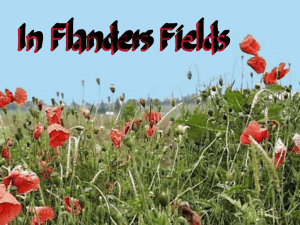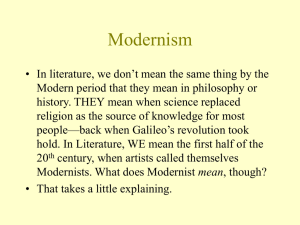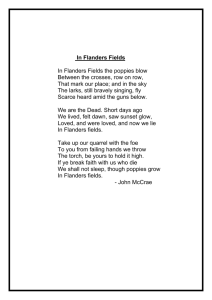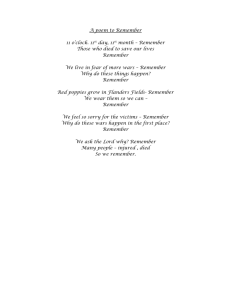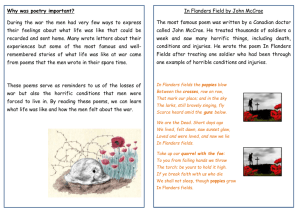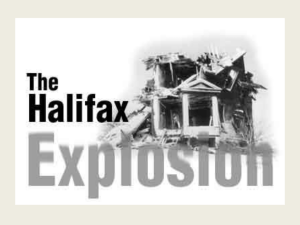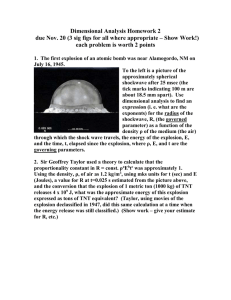Canada and World War I
advertisement
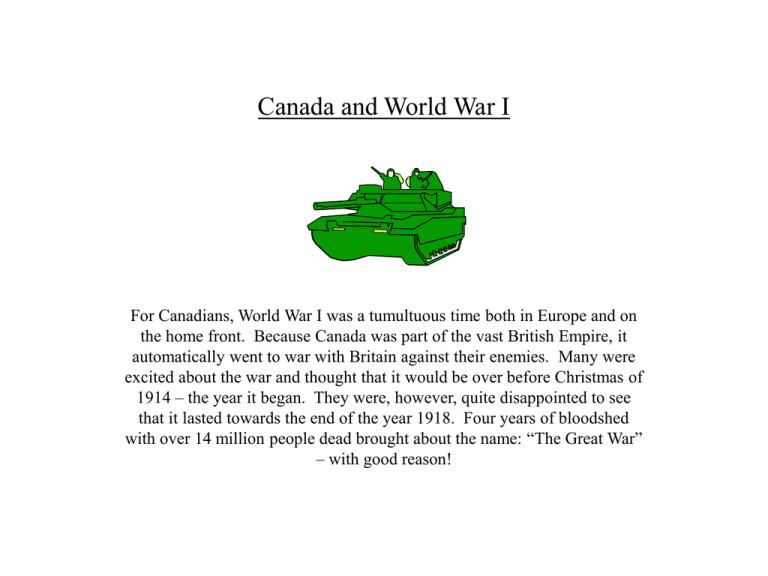
Canada and World War I For Canadians, World War I was a tumultuous time both in Europe and on the home front. Because Canada was part of the vast British Empire, it automatically went to war with Britain against their enemies. Many were excited about the war and thought that it would be over before Christmas of 1914 – the year it began. They were, however, quite disappointed to see that it lasted towards the end of the year 1918. Four years of bloodshed with over 14 million people dead brought about the name: “The Great War” – with good reason! In Flanders Fields In Flanders Fields By John McCrae (1915) In Flanders fields the poppies blow Between the crosses, row on row, That mark our place; and in the sky The larks, still bravely singing, fly Scarce heard amid the guns below. We are the Dead. Short days ago We lived, felt dawn, saw sunset glow, Loved and were loved, and now we lie, In Flanders fields. Take up our quarrel with the foe: To you from failing hands we throw The torch; be yours to hold it high. If ye break faith with us who die We shall not sleep, though poppies grow In Flanders fields. Answer the following questions after reading the poem “In Flanders Fields”: •Who? •What? •Where? •When? •Why? •How? •Explain how this is significant to “the twentieth century belong[ing] to Canada”? Poem from: http://www.canoe.ca/RemembranceDay/mcrae.html Picture from: www.americanmeadows.com Vimy Ridge Canadians under Fire at Vimy Ridge Answer the following questions after analysing the picture on the left hand side: Who? What? Where? When? Why? How? Explain how this is significant to “the twentieth century belong[ing] to Canada”? Picture from: http://www.cbc.ca/news/background/vimy/ The Halifax Explosion December 6th, 1917 “Halifax had a long history of association with the navy and the sight of a large number of ships in its harbour was not uncommon. However on the morning of December 6, 1917, a most uncommon sight greeted citizens. On this morning the French munitions ship Mont Blanc collided with the Belgian Relief vessel Imo and the Mont Blanc caught fire. Attempts to douse the flames failed and the crew rowed fiercely to the docks warning people of the impending explosion. For many it was too late. When the explosives ignited the results were horrific. The sound of the explosion broke windows in buildings in Truro, 100 km away, an d was heard as far away as Prince Edward Island. This was the largest non-atomic explosion in history. Over 1600 were killed and 9000 were injured. The hardships of the people increased when the city was hit with a severe snowstorm. Many people feared that this explosion had been the result of a German attack or the work of spies. Relief was sent from all parts of the nation and also from many New England states. It would take the city and its people years before they recovered from the physical and psychological damage caused by the explosion.” Answer the following questions after reading the preceding information: Who? What? Where? When? Why? How? Explain how this is significant to “the twentieth century belong[ing] to Canada”? From: Face of a Nation. Written by Bolotta, Hawkes, et. al. Gage Educational Publishing Company: Toronto: 2000.
